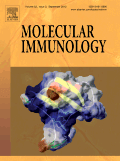
MOLECULAR IMMUNOLOGY
Scope & Guideline
Elevating Research in Immunology and Molecular Dynamics
Introduction
Aims and Scopes
- Cellular and Molecular Mechanisms of Immunity:
Research articles explore the cellular and molecular underpinnings of immune responses, including the roles of specific immune cell types such as T cells, B cells, and innate lymphoid cells (ILCs) in various conditions. - Immunotherapy and Cancer Immunology:
The journal consistently emphasizes the development and application of immunotherapeutic strategies in oncology, including CAR-T cell therapy, checkpoint inhibitors, and vaccines, showcasing advancements in cancer treatment. - Role of Metabolism in Immune Function:
A significant focus on how metabolic pathways influence immune cell differentiation, function, and responses to therapies, highlighting the intersection of immunology and metabolism. - Neuroimmunology and Inflammation:
Studies addressing the relationship between the immune system and the nervous system, particularly how immune responses can affect neurological conditions and vice versa. - Infection and Immune Responses:
Investigations into how the immune system interacts with various pathogens, including viruses, bacteria, and fungi, providing insights into host defense mechanisms and potential therapeutic interventions. - Genetic and Epigenetic Regulation of Immunity:
Research on how genetic and epigenetic factors influence immune cell behavior and disease susceptibility, contributing to the understanding of autoimmune disorders and cancer.
Trending and Emerging
- Innovative Immunotherapies:
There is a growing emphasis on novel immunotherapeutic strategies, including engineered cell therapies and combination treatments, with a focus on enhancing efficacy and safety in clinical settings. - Metabolic Reprogramming of Immune Cells:
An increasing number of studies are investigating how metabolic pathways influence immune cell function, particularly in cancer and chronic diseases, highlighting the importance of metabolism in immunology. - Microbiome and Immune Interactions:
Research exploring the relationship between the microbiome and the immune system is gaining traction, with implications for disease prevention and therapy, particularly in autoimmune and inflammatory conditions. - Neuroimmune Interactions:
Emerging studies are delving into the interactions between the immune system and the nervous system, exploring how inflammation can affect neurological diseases and vice versa. - Personalized Immunotherapy Approaches:
There is a trend towards personalized medicine in immunotherapy, focusing on tailoring treatments based on individual genetic and immunological profiles to improve outcomes.
Declining or Waning
- Traditional Autoimmunity Studies:
There is a noticeable decrease in the publication of studies solely focused on classical autoimmune disease mechanisms without integrating newer methodologies or therapeutic approaches. - Basic Immunological Mechanisms Without Clinical Application:
Research purely investigating fundamental immune mechanisms without direct implications for therapy or disease management has become less prevalent, as the journal leans towards translational research. - Non-specific Immunomodulation:
Publications focusing on broad, non-specific immunomodulatory effects are declining, as there is a shift towards more targeted approaches in immunotherapy. - Pathogen-Specific Immunity Without Broader Implications:
Studies detailing pathogen-specific immune responses without exploring their implications for vaccine development or therapeutic strategies are becoming less common.
Similar Journals
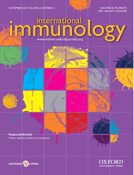
INTERNATIONAL IMMUNOLOGY
Transforming Knowledge into Therapeutic Solutions in Immunology.INTERNATIONAL IMMUNOLOGY, published by OXFORD UNIV PRESS, stands out as a premier journal in the field of immunology, providing a vital platform for disseminating groundbreaking research and innovative developments within the discipline. With an impressive Q1 ranking in Immunology and Allergy, as well as in Medicine (miscellaneous), it consistently showcases high-impact studies that contribute to the advancement of immunological knowledge. The journal spans over three decades, from its inception in 1989 to its ongoing contributions as of 2024, thus solidifying its reputation in the scientific community. Researchers, professionals, and students will find valuable articles that delve into the complexities of immune responses, therapeutic interventions, and emerging immunological paradigms, ensuring INTERNATIONAL IMMUNOLOGY remains at the forefront of knowledge in the life sciences.

NATURE IMMUNOLOGY
Pioneering insights that shape the future of immunology.NATURE IMMUNOLOGY is a premier academic journal published by NATURE PORTFOLIO, dedicated to advancing the field of immunology. With an impressive impact factor that reflects its esteemed position, this journal ranks in the top quartile (Q1) of renowned categories, including Immunology and Allergy. Serving as a crucial platform for researchers, professionals, and students, NATURE IMMUNOLOGY showcases cutting-edge research, comprehensive reviews, and insightful perspectives that drive innovation in immunological science. Based in the United Kingdom, this journal has been a vital contributor to the global discourse on immune responses and related diseases since its inception in 2000. Researchers can benefit from its rigorous peer-review process, ensuring that only high-quality studies are disseminated, thus enhancing their academic pursuits and practical applications. Explore the latest findings and trends within this flourishing discipline, making NATURE IMMUNOLOGY an essential resource for anyone engaged in the study of the immune system.

IMMUNOLOGY
Exploring the Depths of Immunological ScienceIMMUNOLOGY is a premier journal published by Wiley that has been at the forefront of the field since its inception in 1958. With an impressive impact factor and classified in the Q1 quartile for both Immunology and Allergy as of 2023, this journal is highly regarded among researchers and professionals alike. It ranks 36th out of 233 in the Medicine/Immunology and Allergy category, and 40th out of 236 in the Immunology and Microbiology segment on Scopus, placing it firmly within the top percentile of its field. The journal is dedicated to publishing high-quality research that advances our understanding of immunological processes, bridging basic science with clinical applications. Although it does not operate under an open-access model, it offers conventional access options that remain integral to the dissemination of vital immunological research. With its broad scope and commitment to scholarly excellence, IMMUNOLOGY continues to serve as an essential resource for those seeking the latest advancements in immunology, fostering innovation and collaboration among scientists globally.

Immunological Medicine
Exploring the Frontiers of Immune HealthImmunological Medicine, published by Taylor & Francis Ltd, is an esteemed open-access journal that has made significant strides in the field of immunology since its establishment in 2018. With an E-ISSN of 2578-5826, the journal has quickly gained recognition for its contribution to advancing immunological research, evidenced by its impressive ranking in the Q2 quartile for both immunology and allergy. Positioned in the United Kingdom, it offers a platform for publishing high-quality original research, reviews, and case studies that delve into the complex interactions of the immune system and its implications for human health. The journal serves as a vital resource for researchers, professionals, and students engaged in the burgeoning fields of immunology, providing open access to a wide audience and fostering collaboration and innovation. With a current Scopus ranking of #81 out of 233 in Immunology and Allergy and #97 out of 236 in Immunology and Microbiology, the journal aims to enhance the visibility and impact of cutting-edge research by bridging the gap between academia and clinical practice.

JOURNAL OF IMMUNOLOGY
Advancing Immunological FrontiersWelcome to the JOURNAL OF IMMUNOLOGY, a prestigious publication associated with the American Association of Immunologists and dedicated to advancing the field of immunology. With a rich history dating back to 1945, this journal is renowned for its high-impact research, evident in its notable 2023 Q1 rankings in both Immunology and Allergy, as well as its strong positions in Scopus rankings—Rank #68 in Immunology and Allergy and Rank #79 in Immunology and Microbiology. Although it operates on a subscription basis, its commitment to publishing cutting-edge studies ensures that it remains a vital resource for scientists, healthcare professionals, and students alike. As the journal continues to pave the way for innovative research and breakthroughs in immunological science, it facilitates a platform for dialogue and discovery among researchers and practitioners across the globe.

FEBS Journal
Advancing the Frontiers of Biochemical ResearchFEBS Journal is a prestigious, peer-reviewed publication dedicated to advancing the field of biochemistry, cell biology, and molecular biology. Published by WILEY in the United Kingdom, this journal boasts an impressive impact factor and ranks in the top quartile (Q1) across multiple relevant categories, including Biochemistry, Cell Biology, and Molecular Biology, reflecting its significant contribution to scientific research. With an ISSN of 1742-464X and an E-ISSN of 1742-4658, the FEBS Journal publishes original research and comprehensive reviews that push the boundaries of knowledge and innovation in the biosciences. As a vital resource for researchers, professionals, and students alike, the journal offers Open Access options, ensuring that cutting-edge discoveries are accessible to a broad audience. With a publication history converging from 2005 to the present and a robust emphasis on high-quality scholarly work, the FEBS Journal remains an essential platform for the dissemination of significant findings and advancements in the life sciences.
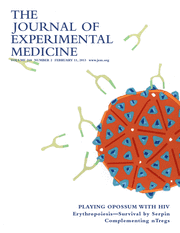
JOURNAL OF EXPERIMENTAL MEDICINE
Elevating Experimental Medicine to New HeightsJOURNAL OF EXPERIMENTAL MEDICINE, published by Rockefeller University Press, is a renowned peer-reviewed journal dedicated to advancing the field of experimental medicine since its inception in 1896. With an impressive impact factor and categorized in the Q1 quartile for Immunology, Immunology and Allergy, and Miscellaneous Medicine, this journal stands at the forefront of medical research and innovation. It provides a prestigious platform for scholars and practitioners to disseminate groundbreaking findings that drive the understanding of disease mechanisms and therapeutic strategies. While the journal is not open access, it maintains high visibility and engagement within the scientific community, fostering collaboration among researchers, professionals, and students alike. The journal's consistent ranking in the top percentiles of Scopus illustrates its significant impact and commitment to excellence in medical research.
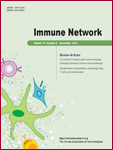
Immune Network
Exploring the Frontiers of Immunity and DiseaseImmune Network is a prestigious journal dedicated to disseminating high-quality research in the field of immunology, infectious diseases, and allergy, under the esteemed KOREA ASSOCIATION OF IMMUNOLOGISTS. Founded in 2016, this journal has quickly ascended to a top-tier publication, achieving Q1 rankings in 2023 in multiple relevant categories, including Immunology, Allergy, and Infectious Diseases. With a strong emphasis on innovation and interdisciplinary research, Immune Network appeals to a diverse audience of researchers, professionals, and students keen on advancing the understanding of immune responses and disease mechanisms. However, it is crucial to note that the journal operates under a subscription model without open-access provisions. Its impact factor further solidifies its reputation, reflecting the significant influence of the articles published. Located in South Korea, the journal serves as a global platform for sharing revolutionary insights and fostering collaborations within the immunology community.

Innate Immunity
Empowering Researchers in the Realm of Innate ImmunityInnate Immunity, published by SAGE Publications Ltd, serves as a vital platform for disseminating cutting-edge research in the fields of immunology, microbiology, cell biology, and infectious diseases. With an ISSN of 1753-4259 and an E-ISSN of 1753-4267, this journal has been a prominent contributor to the academic community since its inception in 1996, focusing on the innate immune response and its implications for health and disease. Holding a respectable impact factor and categorized in the Q2 and Q3 quartiles across various relevant domains, Innate Immunity ranks competitively in major databases, including Scopus, where it appears in the top 75th percentile for Infectious Diseases. Researchers and professionals are encouraged to explore its wealth of articles that are pivotal in bridging fundamental immunology with clinical applications, fostering a deeper understanding of immune mechanisms vital for combating human diseases.
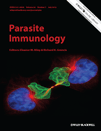
PARASITE IMMUNOLOGY
Innovative Insights into Immunology and Parasitology.PARASITE IMMUNOLOGY, published by Wiley, is a leading journal in the field of immunology and parasitology, with an ISSN of 0141-9838 and E-ISSN of 1365-3024. Since its inception in 1979, it has played a pivotal role in advancing our understanding of host-parasite interactions, immunological responses to parasitic infections, and the mechanisms of immunological resistance. The journal is adeptly positioned within the academic community, currently holding a prestigious Q2 ranking in Parasitology and a Q3 ranking in Immunology for 2023, indicating its significant influence and relevance. Its comprehensive scope attracts a diverse readership, contributing to the discourse surrounding novel therapeutic approaches and emerging challenges in parasitic diseases. With a consistent convergence of research until 2024, PARASITE IMMUNOLOGY is an essential resource for researchers, professionals, and students seeking to deepen their knowledge and foster collaboration in these dynamic fields. Although it is not an open-access journal, the insights shared within its pages are invaluable for shaping future research trajectories.